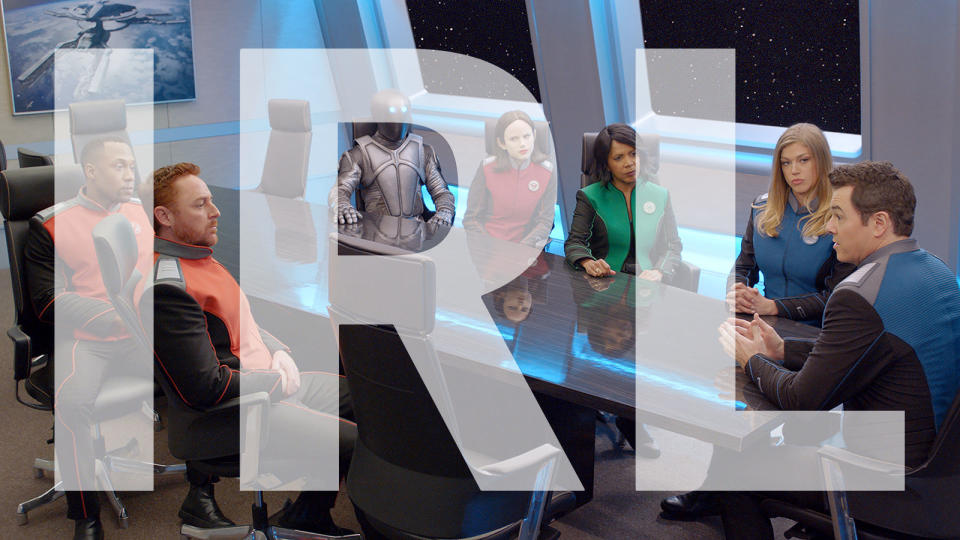What we're watching in February
This month we've queued up Netflix's Fyre Festival doc, 'Titans' and 'The Orville.'
This week in IRL Mariella Moon takes some time to consider the lasting impact of Netflix's Fyre Festival documentary. Separately, Mat Smith explains why DC's Titans show is worth a watch -- especially if you don't need to pick up a new streaming subscription -- and Dan Cooper investigates the surprising success of Seth McFarlane's The Orville.
Fyre: The Greatest Party That Never Happened

Mariella Moon
Associate Editor
I had a pretty good idea of what happened during the Fyre Festival: my fellow Engadget editors and I watched the situation unravel in real time on social media. I watched as attendees posted updates on Twitter and Reddit, and I was witness to how they were gleefully mocked online for spending thousands on a luxury music festival and arriving to evacuation tents, wet mattresses and deconstructed cheese sandwiches. That's why I didn't know what to expect when I watched Netflix's Fyre documentary. By the time I was done, though, it became pretty clear that its creators found an effective way to make people care about the event -- looking around social networks these days, you can see that the documentary changed a lot of people's perception.
Fyre is no longer just about rich kids getting scammed. The documentary showed that the fiasco also damaged the lives of Fyre's employees and workers on the Bahamas, including a restaurant owner who used $50,000 of her own money to feed everyone involved in putting the festival together. It also gave us Andy King, the charming event producer who regaled us with how he found himself willing to perform oral sex to make sure the event goes through. Unfortunately, Netflix failed to secure an interview with Fyre mastermind Billy McFarland, so you won't hear his side of the story. Depending on how you feel about him after watching, though, you'll probably be fine with that: Hulu had to pay McFarland what might be hundreds of thousands of dollars to make an appearance in its production.
Titans

Mat Smith
Bureau Chief, UK
As Marvel's TV universe winds down its Netflix presence, finding streamable super-hero antics has lead me to, gasp, DC, and Titans, the first show made for the comic book company's dedicated streaming service. Which isn't around in the UK.
(Fortunately for me, it's streaming on Netflix here -- meaning I don't have to deal with the bigger question of whether comic spin offs warrant an entirely new streaming service. I don't think they do...)
In comparison to the unashamedly camp Legends of Tomorrow, Titans is dark. Gotham, Daredevil levels of bleak. Especially in the beginning. The show focuses on Robin and Raven at the start, with the former trying to break away from the shadow of Batman, while the latter is afraid of what her dark, growing powers are capable of. Starfire and Beast Boy make their appearances later, as Titans takes a very different path in growing out a team you probably already know from the Cartoon Network animated series, if not the comic book originals.
There's some nice glimpses of the wider DC universe: Batman is, of course, mentioned if hardly ever seen on-screen; Robin gets some superhero-ing advice from Wonder Girl; and the standout baddie of Season 1, the (reinterpreted) Nuclear Family, which is far more sinister and interesting than the demonic big bad that comes later.
The season's climax sets the show up well for season two. Not only does a core member switch sides (I think?) but a new addition is teased in the closing moments — with a superpowered canine buddy in tow. I hope DC figure out how to bring us a hero series with a little less misery and bleakness — I think I'm done with that. If the creators can walk the fine lines between Gotham and Legends, this could have legs.
The Orville

Daniel Cooper
Senior Editor
It's typical of the way Hollywood operates that we spend ages waiting for a new space show and two come along at once. Within a week of each other, we saw the premieres of The Orville and Star Trek Discovery airing on network TV. The latter was CBS' big budget return to sci-fi after more than a decade, while the former also existed.
The chips were stacked against The Orville from the moment the first trailer aired, focusing on the show's gag-heavy pilot. It made it look like the sort of show that you'd watch if it was on, but not bother to seek out otherwise. My expectations were low, especially compared to the hype train on the run-up to Discovery's premiere.
It didn't help that The Orville looked like Fox was bankrolling Seth MacFarlane's vanity project to keep him happy. Or that, despite his liberal credentials, MacFarlane makes Rupert Murdoch a fortune on the back of a series of gay jokes. Going in, then, I was expecting to despise a show that let a 45-year-old man play at Star Trek for 13 weeks.
If you're unfamiliar with the premise, The Orville is basically Star Trek: The Next Generation, but goofy. In our future, humanity has moved beyond money, religion and vanity, instead choosing to journey beyond the stars. You know, seeking out new life, new civilizations and boldly going where no-one has gone before.
Most of the characters are from the Trek playbook, including the robot that's studying what it means to be human. There's a noble, stoic warrior from a culture that values masculinity over everything else. Oh, and a maverick helmsman that has been rescued from ignominy after being too clever-clever in space. Not to mention a young woman security officer who is trying to make their mark in the world, and an all-wise doctor who mentors the other characters.
At the start, the show was a bit of a rollercoaster, especially in its tone, which could switch from goofy to serious in the same scene. I don't know if MacFarlane intended The Orville to be a bait-and-switch, or if the team simply ironed out the kinks in its tone. Very quickly, faster than a lot of genre shows, it settled into a groove where the comedy and drama began to mesh.
And it has the benefit that it can lean into the tropes of classic TV sci-fi and subvert them for comic effect. You can almost imagine the (numerous) former Trek staffers on the show going "Aw, wouldn't it be great if we'd done this!" in the writer's room.
And, like Star Trek before it got a studio-mandated doomy-gloomy reboot, The Orville uses its format to do exploration as allegory. There's been episodes on trans kids, porn addiction, the patriarchy, religious fundamentalism, the politics of war and so-called cancel culture. It's a show that's fundamentally about ideas and people that's just punctuated with dick jokes.
For all its faults, The Orville has a point of view, and even tries to have something to say, even when there is no easy answer. The semi-regular "issue" episodes are po-faced and hamfisted and often end with a shrug of "this is too complex to debate in 43-minutes." But that's exactly how TNG was as well, and nobody hated on that show for its heavy-handed moralizing.
And, for all that, it's kinda fun, and light, in a way that we don't have a lot of on our TV right now. In fact, I'd describe it as a warm show, which isn't afraid to let its humanism shine through in an age where we need some of that. The biggest compliment I think I can give it is that, each Friday, when I watch new episodes of both space shows, I'm watching The Orville first.
"IRL" is a recurring column in which the Engadget staff run down what they're buying, using, playing and streaming.










